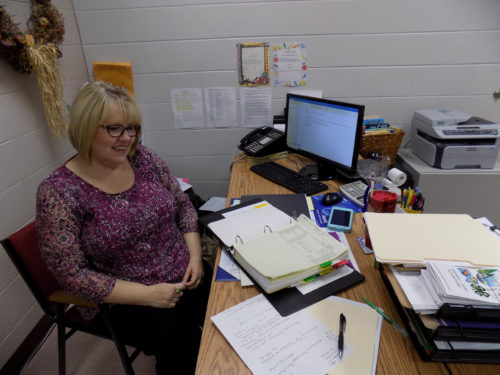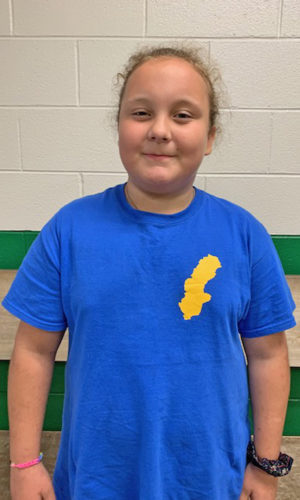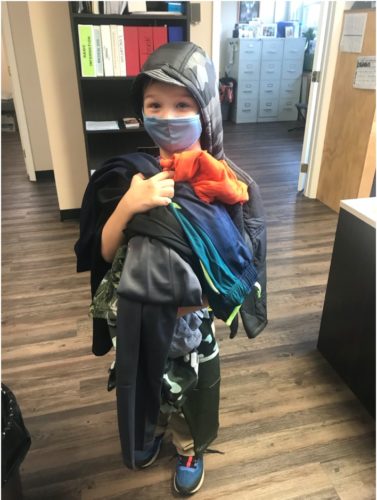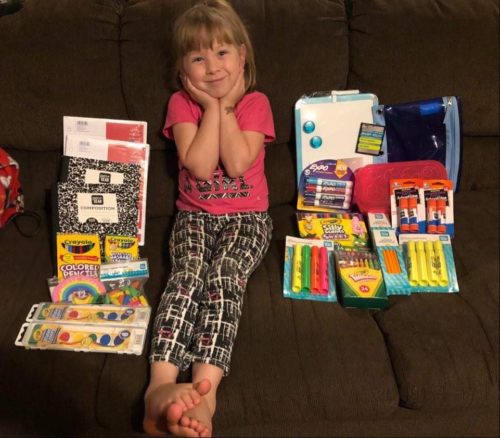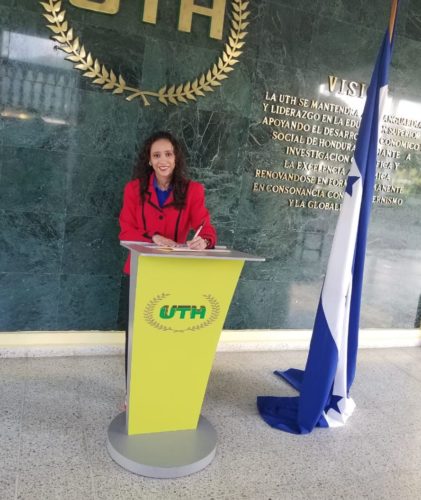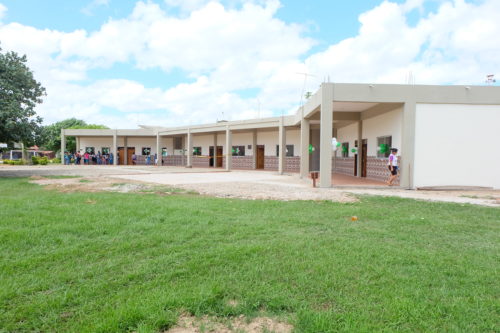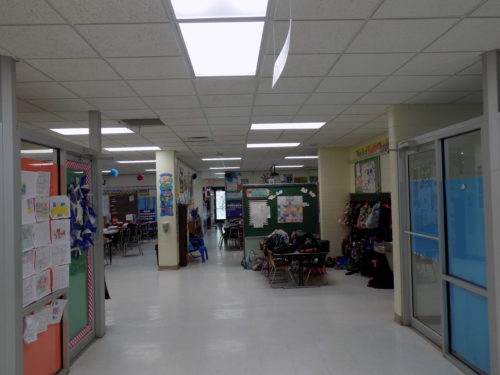In 1963, President Kennedy formed a state-federal cooperative committee known as the President’s Appalachian Regional Commission (PARC). Its purpose was to develop a comprehensive economic development model for Appalachia, where one out of three Appalachian people lived in poverty; the per capita income was just 23% of the national income; and where, by the end of the 1950’s, two million people had left the region due to lack of economic opportunity. The Commission released its report in 1964, which was the same year in which Children Incorporated was founded.
Over the last few months, I held “virtual visits” with our coordinators as they discussed the impact of the sudden closures of their schools due to the pandemic, and how it will affect the 2021 school year, and more.
The Appalachian region was originally dependent on agriculture, forestry, and mining. Its economy has since grown and become more diverse, and many counties have improved their economic status from the distressed category. However, many areas of the region still need basic infrastructure, such as electricity, paved roads, and water and sewer systems — and high-speed internet.
Research has shown that geographic isolation is the major driver, historically and currently, for economic stagnation. The second driver was — and remains — poor access to adequate healthcare. In part due to their isolation, Appalachian people were often at the mercy of the weather — snowstorms drove people off the mountainous roads and into their homes for days at a time, thus reducing economic productivity. On a micro level, the rugged and poor roads kept people separated from one another, making pooled or shared riding less feasible. On a macro level, the mountainous terrain made it more difficult to get railroads established in Appalachia, even decades after trains could travel from the Atlantic to the Pacific. This made it more challenging to get goods shipped for sale, and thus much less attractive for larger manufacturers to locate in Appalachia. Furthermore, geographic isolation led to a lack of education in the Appalachian Mountain region. Many students found they had to drop out of school to help support their families.
When the Appalachian Regional Commission was created, the 29 western North Carolina counties that fell within the Appalachian Mountain region were all economically distressed.
From the 1990’s through now, North Carolina’s counties have steadily made economic gains, but poverty is still rampant in certain areas, and today, Children Incorporated offers sponsorship support in four counties because there are still many at-risk and/or transitional sections in each county with many children in great need.
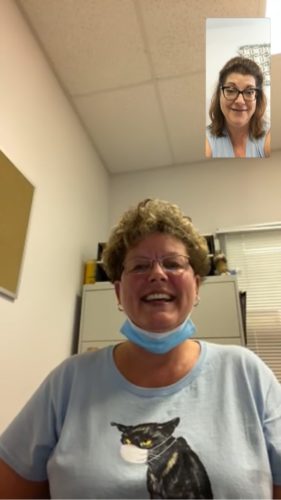
Renée hosted virtual meetings with our coordinators in North Carolina due to the pandemic.
Over the last few months, I held “virtual visits” with our coordinators as they discussed the impact of the sudden closures of their schools due to the pandemic, and how it will affect the 2021 school year, and more.
Alleghany High School
I had a nice Zoom meeting with our new Volunteer Coordinator, Hannah, at Alleghany County High. She is really taking our program seriously — she had a Zoom meeting for an hour prior to our meeting with the former coordinator, Lucy, who transferred to another school. Hannah wanted to ask Lucy what it’s like being a coordinator, what she enjoyed and what she found challenging.
Before becoming a counselor, Hannah was a teacher for eight years, including in the Alleghany County, North Carolina school system. She grew up here, graduated from UNC Chapel Hill, and then returned home. Hannah holds a bachelor’s degree and two master’s degrees. She knows the community and families very well. We are lucky to have her volunteering for our program.
We talked about the county’s economy, which is hanging in there, about the same through the pandemic. Some businesses are really struggling, but most are hanging on.
We talked about staffing and her workload. Hannah said that her new job has been very demanding — learning the new position as a counselor, learning how to operate the Children Incorporated sponsorship program, and then tackling the pandemic. Despite its challenges, Hannah understands the value of our program, and that was very apparent based on a story she told me about one of our sponsored children.
“Sponsors really are a blessing, and I can’t express enough how I appreciate mine.”
Lesley* and Hannah spoke on the phone in order to do a “socially distanced check-in.” Lesley told Hannah , “My sponsor is such a blessing to my family and me. It’s so great having a Christmas dinner delivered to our doorstep every year, it makes me feel so thankful and grateful for my sponsor. I get a yearbook every year because of my sponsor, and I wouldn’t be getting one if it weren’t for him. It’s a really great feeling knowing that you have an angel on earth looking out for you. Sponsors really are a blessing, and I can’t express enough how I appreciate mine. Having a sponsor really does make a difference in a life and if it weren’t for them, I don’t know where a lot of students would be.”
Glade Creek Elementary School
I had a virtual project meeting with our Volunteer Coordinator, Laurie, via FaceTime. Laurie works as the school’s secretary and finance officer.
Glade Creek is located in the community of Ennice in the northeastern part of Alleghany county. Outside of town, the land is immediately rural, dotted with small farms. It is an area of great natural beauty.
Just east of the town is Cumberland Knob, the point where the Blue Ridge Parkway first began construction in 1935. It was the parkway’s first recreation area open to the public. There is a picnic area and a recreation field that visitors and residents are welcome to use.
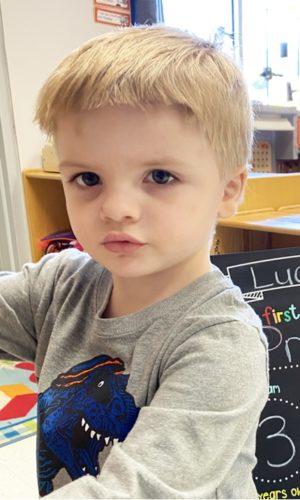
Our sponsored children are benefiting so much from their sponsors even despite school interruptions in 2020.
Laurie said it has been challenging to access all of the children, but the staff has made it work. They are still on Re-Opening Plan B, which means the buildings are at 50% capacity. Students alternate between in-person and online instruction.
“Most of the families that our sponsorship programs serve consist of adults who work in the county seat, Sparta, at low wage jobs, or they are farm laborers. Some are struggling small farmers. And some are retired grandparents and great grandparents who have custody of the children,” said Laurie.
Piney Creek Elementary School
I had a virtual project meeting with our Volunteer Coordinator, Ashley, via Zoom. Ashley works at the school as an administrative assistant. She gets some help with our program from Amanda, who is the school secretary.
Ashley said last spring term, she was shocked at the suddenness with which schools closed and went on fully virtual learning. Teachers scrambled — and succeeded — at a variety of methods to keep the students engaged and learning online. With this fall term on the state’s Reopening Plan B, Ashley is hoping everyone can get the kids back on as much of a normal routine as possible.
Piney Creek is located northwest of Sparta. The New River — yes, the same one that winds through West Virginia and Virginia — flows just west of town.
The community has small family farms, rather than larger ones that employ many laborers. Most are dairy and beef cows. A little south of town is one larger one, Fir Ridge Tree Farm.
Many of the adults in the community commute to the county seat, Sparta, for work. Some go over the state line into Mouth of Wilson, Virginia. About 18% live below the poverty line, which is higher than the national average of 10.5%.
Sparta Elementary School
I had a virtual project meeting with our Volunteer Coordinator, Mandy, via FaceTime. Mandy works as the school receptionist. She gets some assistance with our program from Pam, a former coordinator at Piney Creek who transferred to Sparta. Pam is the school treasurer, and she helps Mandy primarily with the financial reporting, but also sometimes with shopping.
The pandemic has disrupted not just instruction, but athletics, clubs and activities, traditions, and assistance.
Sparta is the county seat. It is the one census tract area of the county that is considered economically distressed. In town, the highest percentage of people living below the poverty line are actually young women 18-24. Many of these are young single mothers. Of the impoverished people living in town, the largest percentage is white, followed by Hispanic/Latino.
There are five low income apartment communities in town, and a significant number of our program-enrolled children at Sparta Elementary School live in one of these units.
Mandy said the adults who live in these apartments have low education and few, if any, have marketable skills. They work very hard at service jobs, such as fast food restaurants, gas stations and convenience stores, and retail at some of the mom-and-pop stores. Some work two jobs. They still don’t make enough money to provide for their children, and there can be a sense of despair. Mandy said our organization’s sponsorship program makes the kids feel hope, and know that someone believes they can succeed and have a better life.
When the schools closed suddenly in March due to the pandemic, lesson plans were done hastily. Teachers and students did not have time to say a proper goodbye before summer break began. The teachers took “sign selfies” — pictures of them holding inspirational messages — and sent them to the kids. These made the children feel special and motivated to keep up with their class work. They knew the teachers would be checking on both their academics and their well-being.
Mitchell County High School
Mitchell County High is the only high school in the county. It serves about 500 students in grades 9-12.
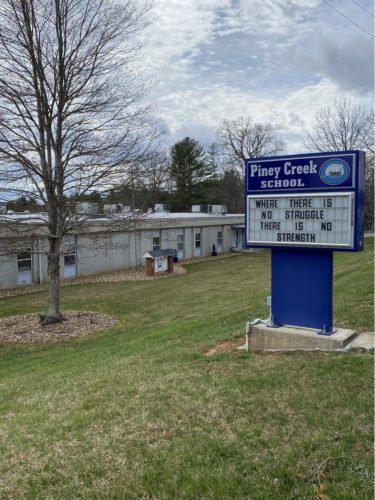
Inspirational messages from teachers and staff often help children to remain positive and hopeful.
Our coordinator, Alexandra, is the school social worker. She feels our sponsorship program is a natural fit and is happy to have our resources for her students. Alex is especially concerned about the students who have “fallen off the grid” during the pandemic. She said in Mitchell County, like in many rural areas, the high school is more than academics. It is a community center. Families come to cheer the football team, the Mountaineers, and they wear their purple and white. It’s the kids’ social life. It is where the most vulnerable get free breakfast and lunch, and for some it is the only food they’ll get. The pandemic has disrupted not just instruction, but athletics, clubs and activities, traditions, and assistance. Alex said most of the students are learning resilience, and they know this won’t be forever. But some cannot handle online instruction, and they are not showing up for their virtual lessons.
Bowman Middle School
I had a virtual project meeting with our Volunteer Coordinators, Rachel and Crystal, via FaceTime. They have worked well together. Rachel is a retired teacher who still helps out in the school and community, and Crystal is the guidance counselor.
Rachel and Crystal said that last spring was crazy, but they managed to get sponsorship benefits to the children by picking up their items at school. They were all masked and social distancing as best as they could.
Both shared that during this pandemic, childcare options have been a big problem for parents. They used Children Incorporated funds and bought bleach for disinfecting, detergent, shampoo, deodorant, toothbrushes and toothpaste, and those were given out via school pick-up. They have already ordered Jansport backpacks for all our sponsored kids. Once school started, they emailed a survey to parents asking for input on their kids’ greatest needs and then shopped accordingly so each child was getting exactly what they needed.
Gouge Elementary School
This is a small kindergarten through fourth grade school serving about 265 students. The demographics are 93% white, 4% Hispanic, and 3% bi-racial. Sixty-one percent of the children come from low income families. It’s located on Laurel Street in town. Mountain laurels and rhododendrons blanket the area in the springtime and may be unofficial county symbols.
Gouge’s official mascot is the eagle, and their school motto is “SOAR: Success, Outstanding Effort, A Positive Attitude, and Respect.” Our Volunteer Coordinator, Monica, is the school secretary. She is experienced and comfortable with our program. The teachers are cooperative, and she has no trouble pulling kids out of class to write thank you letters.
Monica loves our program, and she is very conscientious about getting correspondence for sponsors. Since the pandemic, she is having to go through the teachers to access those kids whose parents have chosen wholly virtual instruction. But it’s working.
The pandemic has also been very tough on the children socially. The area is more geographically remote, and the school is the center of the community. The lack of many clubs and activities is keenly felt.
Mabel Elementary School
Lauren and Kelly are our two new co-coordinators at Mabel Elementary School. Lauren is a kindergarten teacher, and Kelly is the school nurse. They just started as coordinators in August 2020, when the new school year began. Needless to say, there is a lot to do in becoming a volunteer coordinator for Children Incorporated, and to do so during a pandemic is doubly daunting. I sent them orientation and training materials and answered questions and then held a three-way Zoom meeting. They have done a great job in steadily confirming enrollments and submitting new applications and pictures.
Mabel Elementary is a small kindergarten through eighth grade school serving about 174 children. Fifty-six percent of the children come from low income families. The school is located in the small town of Zionville, just down the road from a farm supply store. It is quite rural and is exceptionally beautiful, at some distance from the hustle and bustle of the county seat, Boone.
Valle Crucis Elementary School
I had a virtual project meeting with our Volunteer Coordinator, Traci, via Zoom. She was actually my first “virtual project visit” of the 2020-2021 school year.
This school is 82 years old. In 2019, a group of architects was hired to assess Watauga County Schools’ buildings. Some were deemed worthy of repairs, but others were deemed in need of replacement. One of the latter is Valle Crucis. The county purchased a 14-acre tract of land in the community for the purpose of new construction, located just a quarter mile from the existing structure. Members of the community have had mixed feelings, with some protesting the impact of the new building on the little town’s historic district. They are calling for a new building on the current site, even though it’s subject to flooding.
The school is located in the small community of Sugar Grove, known for its sugar maple trees, and as the site of the old Mast General Store, which is still in operation to this day. The school serves about 394 children in grades kindergarten through eighth grade. Thirty-nine percent of the children come from low income families. Their parents work in Boone at low wage jobs, or they are farm laborers.
Swain Middle School
Our sponsorship program has been managed for many years by Katie, who is the school guidance counselor. She appreciates the program very much but has always struggled with the requirements due to lack of assistance.
Fortunately, this school year Katie has found not one, but two helpers. She is thrilled. Her primary helper is Sandra English, a retired teacher. Her other helper is Laura English, Sandra’s daughter- in-law. The two of them just came on board in December, and they are excited to be involved. I believe we will see faster correspondence as a result.
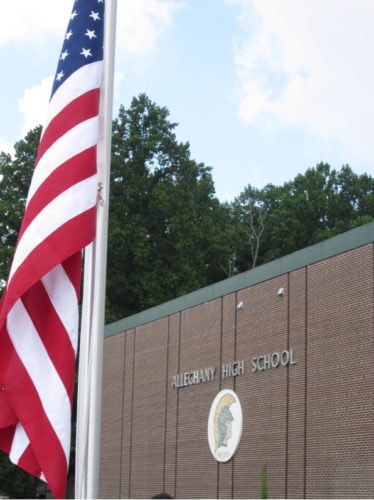
Students in North Carolina have missed the social interactions that school provides for them, but thankfully they are still checked-in on due to the efforts of our volunteer coordinators.
Katie and I had a “virtual visit” via Zoom. By this time, she was really seeing the impact of the pandemic as the new 2020-2021 school year was well underway.
Like many coordinators, Katie reiterated how everyone scrambled last March when the school’s first closed due to the pandemic. While the high school students had been given district-issued Chromebooks previously for online assignments, the middle and elementary students had not received them due to budget constraints and other considerations. However, once the schools shut down, Swain County Public Schools used grant funding to extend the electronic devices to middle and elementary school children, too. These were given to families at the end of March in socially distanced “Drive Through & Pick Up” appointments.
Katie said meals were also provided the same way, as well as spring subsidy purchases.
Now that 2021 has begun, Katie is seeing how families are continuing to struggle. Many do not have internet access, so the district-issued electronic devices are useless at home. As they were doing last spring, families are continuing to drive from their homes throughout the county into Bryson City, where officials and business groups have cooperatively set up eleven WiFi hotspots. The kids sit in the cars and do their schoolwork for hours. The situation is difficult. Of course, most of the students are in the school buildings two days a week with the Plan B learning schedule. However, about one third of the families have chosen Plan C, fully virtual, for their children. Katie said most of these are her Children Incorporated-enrolled children, many of whom are raised by grandparents or who have parents with health conditions that make them at higher risk. Katie worries about them.
Katie sets up Google Meets with her students and their parents or guardians. But after doing so much online learning, many of the children are not excited about logging on again to discuss things with her. She persists, but it may take several attempts to connect.
Katie sent me some activity pictures for the sponsors after she did her holiday shopping. Each child received a Christmas gift bag containing a stocking with candy, games, and warm clothing.
East Elementary School
I had a great “virtual visit” via Google Meets with our Volunteer Coordinator, Ciera. She is the school guidance counselor, and she is still fairly new. Ciera was hired last October in place of the previous counselor who left to take a position closer to her home.
This school year Swain County, like the other counties in North Carolina, had the option to begin instruction on Plan B (blended/hybrid) or Plan C (fully remote). The county chose Plan B, although parents may opt for Plan C on a case-by-case basis. Ciera said it has worked well in terms of logistics and operations — social distancing is easily accomplished. She can see many of the students in person, but everything takes longer. The Plan B students are divided into two groups. One attends classes on Mondays and Tuesdays, and the other attends on Thursdays and Fridays. Wednesdays are for deep cleaning, parent meetings, tutoring, etc.
A good portion of the parents are not comfortable with their kids being in the school buses and buildings, and they’ve chosen Plan C. Those students have been much harder for Ciera to reach, some of which have been her Children Incorporated-enrolled children.
I have to say the “virtual visits” are very successful. The coordinators are eager to share what they are doing, and how sponsors’ support is continuing to make a big difference in the lives of vulnerable children. A huge thanks to our amazing sponsors and donors!
With so many families lacking internet access, their electronic devices are useless — but thankfully the county has partners who have literally opened their parking lots and are glad to have families drive there and use their free Wi-Fi. But not all the families take advantage on a daily basis, and it is apparent that some children are falling behind.
West Elementary School
I had an excellent “virtual visit” via Zoom with our Volunteer Coordinator. His name is Neil Holden, and he is the school guidance counselor.
As its name suggests, the school is at the western end of the county and includes some of the most rural and remote areas. There are 435 children enrolled, and all qualify for free or reduced meals. Neil said the most important thing during this pandemic has been feeding the children. “It’s hard to learn when your stomach is growling and you’re wondering when you’re going to get enough food.”
He is working with the students on building resilience through visits to the classrooms and virtually with those who have chosen the fully remote learning option.

On behalf of all of us at Children Incorporated, we are incredibly grateful for the support or our sponsors for kids in North Carolina — and around the world.
Neil said this has been very difficult for parents and guardians who work, as there are few quality before and after school childcare providers. Thus, about 70% of his parents and guardians chose Plan B, so their kids are at least in the school building two days a week. The 30% who chose Plan C (fully remote) are primarily households with older adults or those with medical conditions that make them vulnerable. Because of those 30%, it has been very easy to keep the classrooms socially distanced.
The pandemic has also been very tough on the children socially. The area is more geographically remote, and the school is the center of the community. The lack of many clubs and activities is keenly felt.
Neil chose a couple of his students for our child spotlights, and he wrote personally about them. He takes our program seriously and is a real asset to our organization.
A thanks to our sponsors
Nothing can replace travel and in-person visits to our affiliated projects. There is nothing like sitting down with a coordinator and discussing how he or she feels our program is doing, the impact it is having on the children, and any special goals or needs for the future.
However, during this pandemic, I have to say the “virtual visits” are very successful. The coordinators are eager to share what they are doing, and how sponsors’ support is continuing to make a big difference in the lives of vulnerable children.
A huge thanks to our amazing sponsors and donors!
*Name changed to protect the child.
***
HOW DO I SPONSOR A CHILD?
You can sponsor a child with Children Incorporated in one of three ways: call our office at 1-800-538-5381 and speak with one of our staff members; email us at sponsorship@children-inc.org; or go online to our sponsorship portal, create an account, and search for a child that is available for sponsorship.
SPONSOR A CHILD
